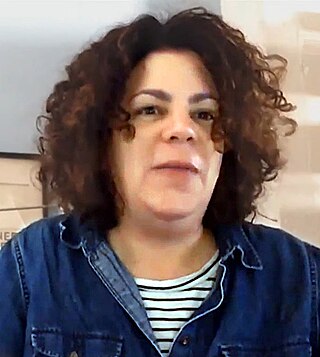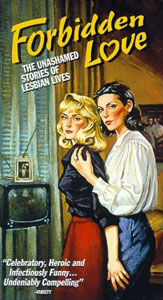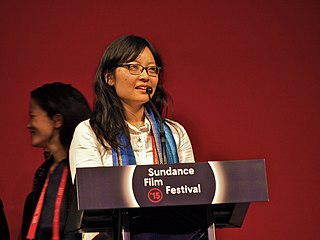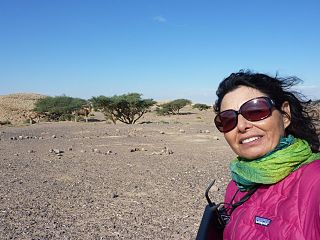Related Research Articles

Jenni Olson is a writer, archivist, historian, consultant, and non-fiction filmmaker based in Berkeley, California. She co-founded the pioneering LGBT website PlanetOut.com. Her two feature-length essay films — The Joy of Life (2005) and The Royal Road (2015) — premiered at the Sundance Film Festival. Her work as an experimental filmmaker and her expansive personal collection of LGBTQ film prints and memorabilia were acquired in April 2020 by the Harvard Film Archive, and her reflection on the last 30 years of LGBT film history was published as a chapter in The Oxford Handbook of Queer Cinema from Oxford University Press in 2021. In 2020, she was named to the Out Magazine Out 100 list. In 2021, she was recognized with the prestigious Special TEDDY Award at the Berlin Film Festival. She also campaigned to have a barrier erected on the Golden Gate Bridge to prevent suicides.

Rose Troche is an American film and television director, television producer, and screenwriter.
Aren X. Tulchinsky, formerly known as Karen X. Tulchinsky, is a Canadian novelist, short story writer, anthologist and screenwriter from Vancouver, British Columbia.

Forbidden Love: The Unashamed Stories of Lesbian Lives is a 1992 Canadian hybrid drama-documentary film about Canadian lesbians navigating their sexuality while homosexuality was still criminalized. Interviews with lesbian elders are juxtaposed with a fictional story, shot in fifties melodrama style, of a small-town girl's first night with another woman. It also inserts covers of lesbian pulp fiction. The film presents the stories of lesbians whose desire for community led them on a search for the few public beer parlours or bars that would tolerate openly queer women in the 1950s and 60s in Canada. It was written and directed by Lynne Fernie and Aerlyn Weissman and featured author Ann Bannon. It premiered at the 1992 Toronto Festival of Festivals and was released in the United States on 4 August 1993. It was produced by Studio D, the women's studio of the National Film Board of Canada.
Holly Dale is a Canadian filmmaker and television director. Over the course of her career, Dale has worked in the Canadian film and television industry as a director, producer, writer, and editor. Although she has completed solo projects, the majority of Dale's work has been in collaboration with her former classmate, Janis Cole. The Thin Line (1977), P4W: Prison for Women (1981), and Hookers on Davie (1984) are some of their most recognized projects. Dale's work has been featured in festivals around the world including North America, Europe, and Australia. She has also received award nominations and wins, including a Gemini Award in 1982 for the Best Theatrical Documentary for P4W: Prison for Women.

Leena Manimekalai is an Indian filmmaker, poet and an actor. Her works include five published poetry anthologies and several films in genres, documentary, fiction and experimental poem films. She has been recognised with participation, mentions and best film awards in many international and national film festivals.

Amber Dawn is a Canadian writer, who won the 2012 Dayne Ogilvie Prize, presented by the Writers' Trust of Canada to an emerging lesbian, gay, bisexual or transgender writer.
Lynne Fernie is a Canadian filmmaker and interdisciplinary artist. She spent fourteen years as the Canadian Spectrum programmer for the Hot Docs Festival from 2002 to 2016, and was described as having a passion as "deep as her knowledge," and it was said that her "championing of Canadian documentaries and the people who make them has never wavered."
Aerlyn Weissman is a two-time Genie Award-winning Canadian documentary filmmaker and political activist on behalf of the lesbian community.

Desiree Akhavan (Persian: دزیره اخوان, born December 27, 1984) is an American filmmaker, writer and actress. She is best known for her 2014 feature film debut Appropriate Behavior, and her 2018 film The Miseducation of Cameron Post. She appeared in the found footage horror film Creep 2.
This is a timeline of notable events in the history of non-heterosexual conforming people of Asian and Pacific Islander ancestry, who may identify as LGBTIQGNC, men who have sex with men, or related culturally-specific identities. This timeline includes events both in Asia and the Pacific Islands and in the global Asian and Pacific Islander diaspora, as the histories are very deeply linked. Please note: this is a very incomplete timeline, notably lacking LGBTQ-specific items from the 1800s to 1970s, and should not be used as a research resource until additional material is added.
Madeleine Lim is a filmmaker, producer, director, cinematographer and LGBTQ activist. She is the founding Executive Director of the Queer Women of Color Media Arts Project (QWOCMAP), and an adjunct professor of film studies at the University of San Francisco. Lim is also a co-founder of SAMBAL and the US Asian Lesbian Network in the San Francisco Bay Area.

Jennifer Phang is an American filmmaker, most known for her feature films Advantageous (2015) and Half-Life (2008). Advantageous premiered at the 2015 Sundance Film Festival, winning a Special Jury Award for Collaborative Vision, and was based on her award-winning short film of the same name. Half-Life premiered at the 2008 Sundance Film Festival and won "Best Film" awards at a number of film festivals including the Gen Art Film Festival, the San Francisco International Asian American Film Festival as well an "Emerging Director Award" at the Asian American International Film Festival.
Mo Bradley is a Canadian film director, producer, screenwriter, media artist, professor, and curator. They have produced over fifty short films and their work has been recognized internationally. Through their work, Bradley challenges traditional gender norms and opposes the heteronormativity that dominates the television and film industry. Bradley's focus is to bring nontraditional representations of sex, gender, and sexuality to the forefront of film. Bradley's work predominantly features queer characters and themes, including their first feature film, Two 4 One. In 2017, Bradley became a professor at the University of Victoria in the Writing Department.

Claudia Morgado Escanilla is a Latino-Canadian filmmaker, writer, script supervisor, producer and curator. She has worked on the festival circuit and commercially. Morgado was the script supervisor of film or television shows including The Twilight Saga: New Moon (2009), The Twilight Saga: Eclipse (2010), Hyena Road and Legends of Tomorrow.

Fawzia Mirza is a Canadian film and TV actress, writer, producer, and director. Her work includes web series Kam Kardashian and Brown Girl Problems, and the 2017 film Signature Move.
Janis Cole is a Canadian filmmaker, producer, writer, editor and professor. She has directed several films over the span of her career. Most of these films were done in cooperation with her friend and professional partner, Holly Dale. Her most notable films include Cream Soda (1976) and Prison For Women (1981).
Ingrid Jungermann is an American director, producer, screenwriter, and actor. They are best known for Women Who Kill, their directorial film debut, and web series The Slope and F to 7th.
Gwen Haworth is a Canadian transgender filmmaker, editor, social worker and instructor, known for her experimental documentaries She's a Boy I Knew (2007) and A Woman With a Past (2014). Haworth is also an advocate for transgender health issues and was chosen in 2014 as one of Vancouver's 12 Remarkable Women at a ceremony on March 8 for International Women's Day.
References
- 1 2 3 4 5 6 7 8 9 10 11 12 13 14 15 Hui-Ling, Lin (April 2011). "BODIES IN MOTION: THE FILMS OF TRANSMIGRANT QUEER CHINESE WOMEN FILMMAKERS IN CANADA". University of British Columbia.
- 1 2 Lin, Hui Ling (Summer 2008). "PUTTING IDENTITIES QUESTION: A BRIEF INTRODUCTION OF QUEER ASIAN FILMMAKERS IN VANCOUVER". West Coast Line, Burnaby. 42: 140–146, 159. ProQuest 214492085.
- ↑ McLelland, Mark; Mackie, Vera (2014). Routledge Handbook of Sexuality Studies in East Asia. Google Books: Routledge. ISBN 978-1317685739.
- ↑ "Desiree Lim". Women in the Director's Chair. Archived from the original on October 19, 2018. Retrieved October 10, 2018.
- 1 2 Harvey, Dennis (July 29 – August 4, 2002). "Sugar Sweet". Variety .
- ↑ Rossi, Cheryl (November 2, 2011). "Filmmaker bets The House at Vancouver Asian Film Festival; Wall Street investment banker and ghosts mix in Desiree Lim's latest". Vancouver Courier .
- ↑ Berman, Sarah (Nov 3, 2011). "Local filmmaker takes a run at Wall Street; Desiree Lim moves beyond comfort zone with genre-bending ghost story about reformed banker". The Vancouver Sun . ProQuest 902258998.
- ↑ Rossi, Cheryl (Nov 2, 2011). "Filmmaker bets The House at Vancouver Asian Film Festival; Wall Street investment banker and ghosts mix in Desiree Lim's latest". Vancouver Courier. ProQuest 902205941.
- ↑ "Desiree Lim". Storyhive. Archived from the original on October 19, 2018. Retrieved October 10, 2018.
- ↑ "Desiree Lim —WIDC". WIDC.